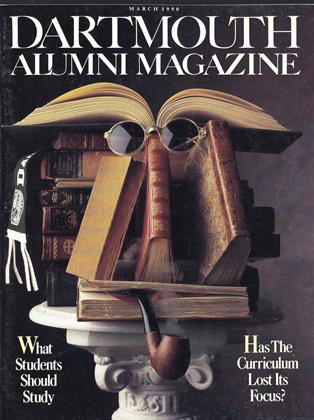1772
A budding thespian named John Ledyard 1776 brings his own stage props to campus and stars in several tragedies. His purpose, according to his biographer, is to introduce "a little variety into the sober tenor of student life." A year later Ledyard boards a canoe he built himself and forever leaves the College.
1791
In an effort to make student life more sober, College authorities forbid "all dramatic exhibitions" and threaten violators with a five-shilling fine. Students flout the ban.
1829
Encouraged by President Nathan Lord, the faculty votes to outlaw "the building of stages and the hanging of curtains for the purposes of theater." Drama goes underground, sustained by the Greek system.
1875
Organized student drama makes a campus encore when the Dartmouth Reading and Dramatic Club stages its first (and only) production. Although cast members have obvious trouble remembering their lines, the dramastarved critic for The Dartmouth finds the presentation "very excellent."
1879
Students stage an all-male production of Gilbert and Sullivan's "H.M.S. Pinafore." Little Buttercup tips the scales at 250 pounds.
1909
Sturgis "Spuddy" Pishon' 10, measuring 5' 3" and 127 pounds, becomes the College's most popular leading lady. Offstage he is Dartmouth's varsity quarterback.
1910
The Classics Department stages "Oedipus Tyrannus" with ancient relics as props. Spuddy Pishon and his brother Emmett '13 play handmaidens to Queen Jocasta. Disaster almost strikes the performance when Emmett, who has his corset on too tight, faints and drops an ancient jar. Spuddy recovers the fumble.
1913
"Real Girl in College Show," proclaims a headline in the Boston American when Dartmouth casts a woman as a woman. The actress, Mary Gray, is a Barnard student on campus for the summer.
1928
Warner Bentley arrives in Hanover and becomes the guiding hand behind Dartmouth theater for the next four decades. Bentley is lured, in part, by the promise of a new theater building. It will be another 34 years before the Hopkins Center opens.
1970
Drama Professor Rod Alexander's presentation of "Lysistrata" features costumes made out of clear vinyl. A local radio announcer advises, "If you should happen to take Aunt Millie, you should each sit in opposite sides of the theater so that you can blush in the dark unseen."
In 1910, Dartmouth's quarterbackwas also its leading lady. Thoughreal women were banned from thestage, the College once considered"legitimate theater" a contradiction interms. One reason may have beenproductions like this one,"The Bakerof Zuyder Zee."
 View Full Issue
View Full Issue
More From This Issue
-
 Cover Story
Cover StoryDartmouth's Steady Course
March 1990 By James Wright -
 Feature
FeatureA Hero to Europe
March 1990 -
 Feature
FeatureADDICTED TO CONVERSATION
March 1990 By Clayton G. Gates '90 -
 Feature
FeatureANCIENT PAGE TURNERS
March 1990 By JONI COLE AND LEE MICHAELIDES -
 Feature
FeatureThe Purpose Gap
March 1990 -
 Feature
FeatureAn Elegant Backwater
March 1990 By Clayton G. Gates '90







